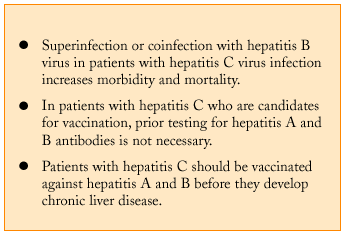Nearly 1.5 million new cases of hepatitis A (HA) are reported annually throughout the world, although the actual figure is estimated to be 3-fold to 4-fold higher. Mortality from HA is low (1.4 per 1000 symptomatic cases), and is due, in most cases, to fulminant disease (60% mortality), which is most frequent in adolescents and adults. In Spain, as noted in the article by Sans et al., the epidemiological pattern of HA has changed; the importance of this change lies in the fact that more symptomatic (hence more severe) forms of the disease are seen much more frequently in adults.1-4
An estimated 300 million persons world wide are infected with the hepatitis C virus (HCV); of these, 5 million live in Europe. The number of HCV carriers in Spain is estimated at 800 000, with an estimated prevalence of 2% for the entire population. Infection by HCV is the main cause of chronic liver disease. Between 75% and 80% of all persons infected with HCV develop chronic liver disease, and more than 25% develop liver cirrhosis in the ensuing 30 to 40 years. Moreover, 70% of all hepatocellular carcinomas are linked to HCV.1-3,5
Superinfection by other hepatitis viruses (in addition to HA) in patients with chronic hepatitis from HCV infection can lead to significant morbidity and mortality. In some patients with chronic liver disease, superinfection with hepatitis A or B virus can lead to acute liver failure.5
Strong evidence supports the benefits of vaccination against hepatitis A and B virus in patients with chronic liver disease.6 All patients with chronic liver disease should be studied to determine whether antibodies to hepatitis B core antigen are present. If immunity is not detected, these patients should be vaccinated against hepatitis A and B. It should be noted, however, that in populations with a low incidence and prior exposure, it may be more cost-effective to forego antibody studies and vaccinate all susceptible individuals. In patients with and without of chronic liver disease, the rates of post-vaccination seroconversion are 94% for hepatitis A and close to 100% for hepatitis B.
Some organisms that issue recommendations on vaccination policies insist that vaccination for hepatitis A should be considered only for patients with chronic hepatitis. Moreover, these organisms emphasize that there are no data to indicate the need for routine vaccination for hepatitis A in carriers of hepatitis B or C virus in the absence of chronic liver disease.5 In Spain, some working groups on vaccination policies include HCV infection as an indication for vaccination against hepatitis A.1
However, in view of the data indicating that 75%-80% of all patients with HCV infection will develop chronic liver disease, it would be good preventive strategy to vaccinate them against hepatitis A and B before chronic liver disease ensues. Because it is clear that superinfection with hepatitis A or B virus in patients with HCV infection increases morbidity and mortality, vaccination as soon as possible for hepatitis A and B are advisable. In our setting, it is more cost-effective to forego prior testing for antibodies and to simply vaccinate all susceptible individuals.









